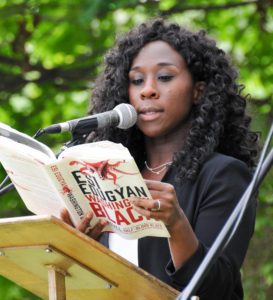
Victoria-based author Esi Edugyan is no stranger to accolades. A two-time Giller Prize winner and 2021 CBC Massey Lecturer, her fiction often centres on themes of race, identity and belonging. Her award-winning novel Washington Black is no exception.
The epic, globe-spanning saga follows George Washington ‘Wash’ Black, an 11-year-old enslaved boy who escapes a brutal life on a sugar plantation in Barbados and goes on a journey filled with science, adventure and self-discovery. Washington Black chronicles Wash’s growth from child prodigy to man of science, as he travels the world in search of a true sense of self-determination while being haunted — both literally and figuratively — by his past life on the plantation.
The novel won the 2018 Scotiabank Giller Prize and is being adapted into a TV series, which Edugyan is executive producing alongside Sterling K. Brown who is also acting in the show.
Edugyan spoke about writing the novel and what motivates her as a writer.
Q: When did you decide that you wanted to be a writer?
Edugyan: I was always a big reader. But writing never seemed like something that was like a viable career for someone like myself. I didn’t really take it seriously, but I always did a bit of dabbling. I started writing poetry — very bad poetry — and then writing short stories.
I guess it was at the end of high school when I had to make a choice as to what I was going to study at university. It didn’t matter what I studied, I was going to go to university — my parents were pretty resolute about that. I thought I would study journalism. Once I got to the University of Victoria I was so compelled by the creative writing aspect, which I had also gone to study, but thought of it as something secondary.
But with teachers like Patrick Lane, Lorna Crozier and Jack Hodgins, I became so impassioned and I thought, OK, this is definitely what I want to do.
Q: What was your inspiration for writing Washington Black?
The inspiration ended up being something that didn’t make it into the book beyond these bare bones things that are still lingering. I thought I was writing a book about the Tichborne Claimant case, which happened in Victorian England in the 1860s and 1870s. It centred around the disappearance of this aristocratic young man, 25-year-old man from the south of England who was shipwrecked and pronounced dead at sea. But his mother refused to believe that and hired a clairvoyant. She then discovered her son was living in Australia and sent for him to come home. A lot of people saw him as being a pretender, but he became a folk hero for the working class.
There was a whole series of trials in which one of the main witnesses for the defence was a man called Andrew Bogle, who was an ex-slave who had retired to Australia. When he was 11 years old, he was stolen off a plantation in Jamaica by Sir Edward Tichborne. I don’t know how he came across this young boy — but he had seen him and somehow decided that he was going to steal him and take him back to England.
I thought that was a fascinating story to have a sense of your life as being one thing and very prescribed and very, very much something that was defined by a lack of freedoms of all kinds. And to be wrenched out of that and taken into this completely alien world, in which you could never have imagined a life for yourself — I found that was my main interest above and beyond all of the craziness of the various trials.
Q: So what was your research process like when writing Washington Black?
I did research for like a year before I started writing it. I was just constantly reading, looking at old files online and in the library, these kinds of things, and then started to write. You can research for years and never sit and write a word, but I had to force myself to sit and write after that.
I spent a long time researching also because I had just given birth to my son. I didn’t feel like I was in the place where I could sit down and obviously keep the hours that you need to keep to do a book. But there was always time to research something here and there. So it was about a year of research and then two years of writing.
Q: Your fiction centres the Black experience in different historical periods and you often write about themes of identity. Why do you feel compelled to write these stories?
I think these things are not always wholly self-chosen. I think you write from certain instincts and you write out of your own experience — and you essentially write what’s in you. So although I would never have put it that way, that those were my abiding interests, I think maybe given who I am, where I was born, all of these things, this has obviously shaped and defined my own life, and these are things that I’m interested in exploring in literature.


